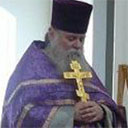On March 25th we celebrate the feast of the Annunciation. The event commemorated is recounted in Luke 1: 26-38. An “annunciation” is an “announcement”, and the feast recalls the archangel Gabriel’s announcement to Mary that she was to be the “Theotokos”, the mother of the incarnate God. The name of the feast in Greek and Slavonic, however, highlights the broader meaning of the feast. Both words (evangelismos, blagoveshchenia) are related to the word for Gospel. The Annunciation, then, means the announcing of the Gospel, the “Good News” of the coming of salvation in Christ.
As Orthodox Christians we have committed ourselves to living by and spreading that good news. Unfortunately, we do not always fulfil our vocation. Indeed, we sometimes act as if the Gospel were bad news, as if it were a burden or even something shameful. We do not live by it, and we do not share it with others. We deny what should be our greatest treasure and hide what should be our proudest boast. Looking at the story of the Annunciation, that first proclamation of the Gospel, can help us understand why we do not share our Faith as we should and how we can do better.
Let us first look at the content of the archangel’s announcement. Gabriel’s greeting told the Theotokos two things. The first is who she was: “Rejoice, O full of grace. The Lord is with you. Blessed are you among women …. You have found favor with God” (Luke 1:28,30). The second is what was to happen: “You shall conceive in your womb and bear a son …. He will be great and will be called the Son of the Most High” (vss. 31-32).
The Gospel reveals who God is and what He has done in the world; we can accept those things easily. But the Gospel also tells us who we are and what we must do. This is the part that disturbs and frightens us. Even the Theotokos experienced a little of that fear and uncertainty on first hearing the angel’s message (vss. 29, 34). Our sinfulness and pride build an image very much at odds with what the Gospel tells us we are really like. Admitting that God is right and that we are wrong is hard to do. Turning to others with that message is equally difficult. But being an Orthodox Christian involves more than merely saying that there is a God and that Jesus Christ is His only begotten Son. It also means accepting the burdens of repentance and of obedience, for, as Scripture says, “It is a fearful thing to fall into the hands of the living God” (Hebrews 10:31).
Fortunately, there is more to the Gospel than the burden of self-knowledge and repentance. The angel also brings the Theotokos a wonderful promise. We too share in that promise. Christ will come into our hearts by the power of His Spirit in order to cleanse us of the sins we have acknowledged and to make us worthy of life in His Kingdom. Recognition of our sinfulness is not the end of the Gospel; God also calls us to faith and reliance on Him and to the hope and joy which come from His love. Awareness of this takes away the fear that comes from the Gospel’s demands. Christ imposes a burden, but He also promises His help in bearing it: “I will give rest to your souls. For my yoke is easy, and my burden is light” (Matthew 11:29-30). As St. Anthony once said, “I no longer fear God, because I love Him, for ‘perfect love casts out fear'” (I John 4:18).
The announcing of the Gospel was not done just by the angel. It was also done by the Theotokos. She proclaimed the Good News by making herself part of it through her response to the God’s call, “Behold the Lord’s servant. May it be with me according to your word” (vs. 38). Later she sings, “My soul magnifies the Lord, and my spirit will rejoice in God my Savior” (vss. 46-47). She accepts the truth of what God says about who she is and puts her trust in what He will do through her. She joyfully acknowledges that it is by God’s grace and strength that she can accomplish her fearful, yet glorious, calling.
God also challenges us to become part of the Gospel by accepting the call to be His servants. We must acknowledge our sin and receive God’s forgiveness and love. We must also tell the world of its need to acknowledge God’s lordship and to accept the glory which awaits it in the service to the greatest of Masters. God entered the world so that we, like the Theotokos, might be “full of grace”, made such by joining to incarnation, death, and resurrection of the Word. This is good news God wants us to announce.
***


